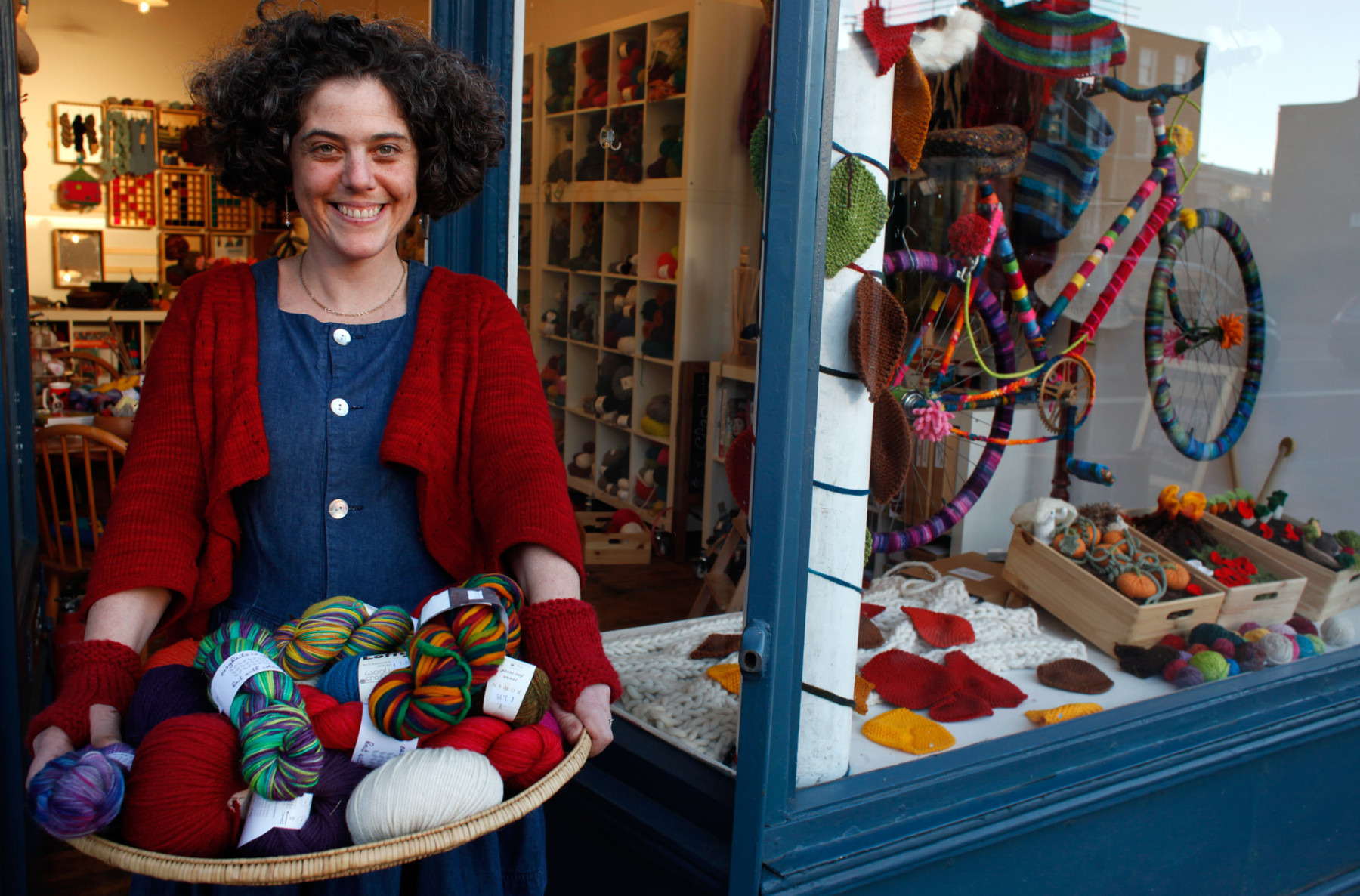The sun was low in the sky, casting an orange light around the room. I’d woken up from an afternoon nap on the couch. We were in an old Ottoman apartment block beside the Gelata tower and I could hear the muezzin’s call to prayer outside and the faint whirr of the AC unit above me. I picked up my knitting for the first time since arriving in Istanbul, to discover that there were just a couple of yards left on the ball I’d started back in Vienna 6 days earlier…
Day 1, 6 August
We’d just arrived at the place in Leopoldstadt, a neighbourhood on the south-west side of Vienna. It was a tall windowed apartment that looked over the perimeter wall of the Augarten Park. Me and my knitting – I’d been working my way down Faïza Mebazaa’s Facette – were adjusting to the quiet. 2 days of being on the move since leaving London had inured me to the noise of travel: the constant sound of the train in motion, the crowded pedestrian tunnels of the metro under the main station, the 3 note jingle and accompanying platform announcements.
This silence was something new. The only break in the stillness, was the gentle billowing of muslin curtains against the still-warm evening air.
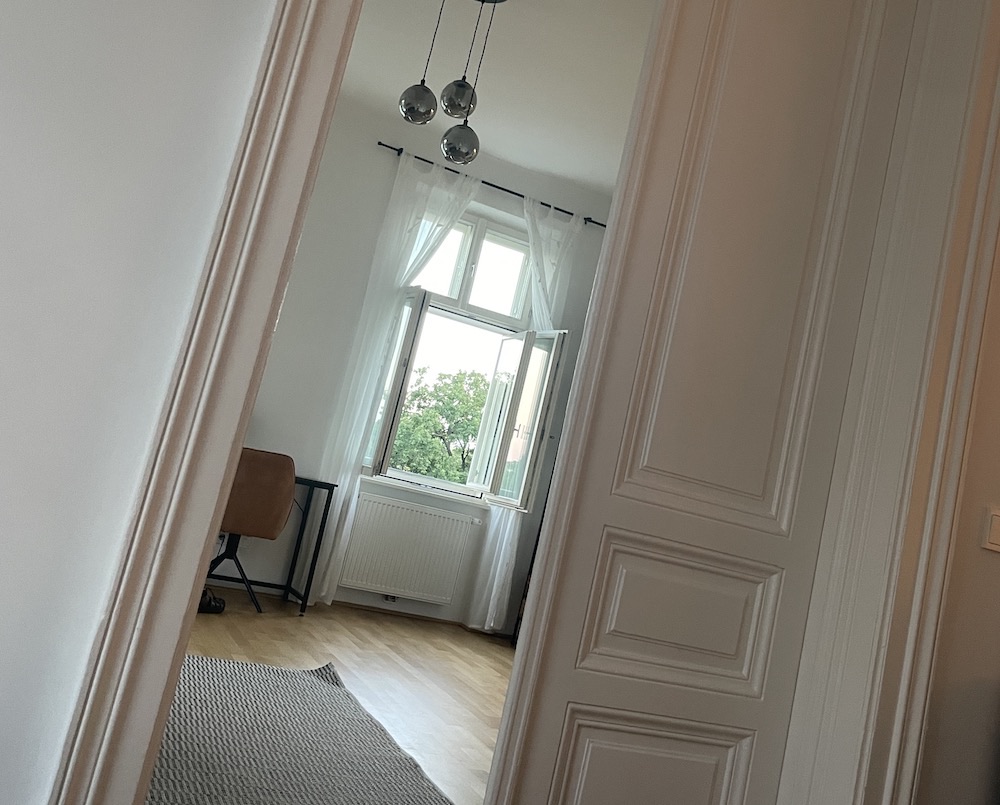
I took the label off a new ball of Xolla Pastoreta and momentarily wondered if this perfectly formed ball could get me the rest of the way down the yoke to the separation for the sleeves, not even considering the other 800 mile journey it was going to take.
Day 3, 8 August
With the new ball spliced on, and nicely worked into the yoke, I zipped it away in my backpack, said goodbye to some Kazakh tourists we’d made friends with on the Wien HBF station platform and watched our train pull in. We boarded the 19.42 Bucharest night train, delighting in the details of this compact Italian sleeper compartment – complete with proper duvets and pillows in pillow slips, a private shower and toilet concealed in a cupboard, and little reading lights at the end of each bunk. I lay down and listened to the sounds of the train and the night, with an odd mix of near and far history swirling around my head. Vienna was home to my granny in her youth. And thanks to the largely unchanged and carefully preserved architecture of the city, there was plenty in the maze of small streets, cafes, specialist shops and elegant parks I’d wandered through over the last 2 days, which helped reveal some of what had shaped the person I had known and loved. There were of course also relics and memories of the trauma which led her to flee at the end of the 1930s. It was a lot, but eventually the gentle rocking of the train prevailed and I fell asleep.
I had no idea what time it was, just that it was dark outside save for the electric light of the station platform. I was woken to the sound of the guard sliding open the compartment door and asking for passports. “Leave the door open.” he said. “Another person will come back to check soon.”
We’ve reached the Hungarian border, D explained, leaning over the edge of the top bunk.
The train began moving again and then jolted to a halt about 10 minutes later. New voices, speaking a different language came aboard the train. Soon another official was at our door. I was properly awake now with my glasses on. Made-up with an immaculately outlined pink lipstick and wearing a grey tightly belted uniform, she spoke with a different accent as she asked for our passports. Then she was gone, and the train rolled on. I took off my glasses, and fell back asleep in the now-Romanian darkness of the train bunk.
Day 4, 9 August
The next time I woke, it was morning sunshine coming through the curtains. I pulled them back to see hills rising in the distance and more trees appearing at the side of the tracks. The scenery changed from forested woodland to more open cultivated fields and pasture, then occasional villages of houses coupled with patched-up barns, and gravel tracks. Chickens and ducks busyed themselves in back yards, separated by little fences from neat rows of low-lying salad veg and wigwammed canes for beans, peas and berries.
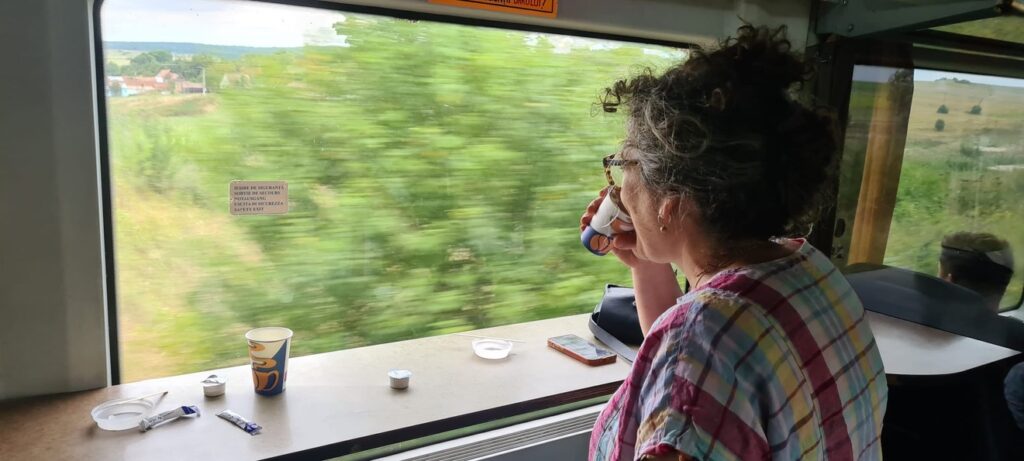
The hours passed in a distracted mixture of reading, yoke increases, and changing-landscape-gazing, before the train finally arrived in Bucharest.
After the shiny shopping areas and fancy digital signage of the big European stations we’d been through in Paris, Frankfurt and Vienna, the Bucharesti Gara Du Nord felt like much more than half a contintent away. There was a kind of old-school station chaos – the sort where you know there’s a system according to which things are running, but making sense of it is a whole other matter. I was riveted by the analogue depatures board with its multi-coloured list of intriguing destination names that hung above the jostling queues in the ticket hall. This place was busy but not in the urgent commuting-to-work way I was more used to. There were tanned wizzened country-folk passengers loaded down with big baskets of provisions, waiting for the long travel home, somewhat disoriented inter-railers with front and back rucksacks, intently studying their phones for a more digital version of events, young lad-ish hawkers, men with flat caps and moustaches and reassuringly strong women whose faces were lined with what I imagined were stories of struggle and survival.
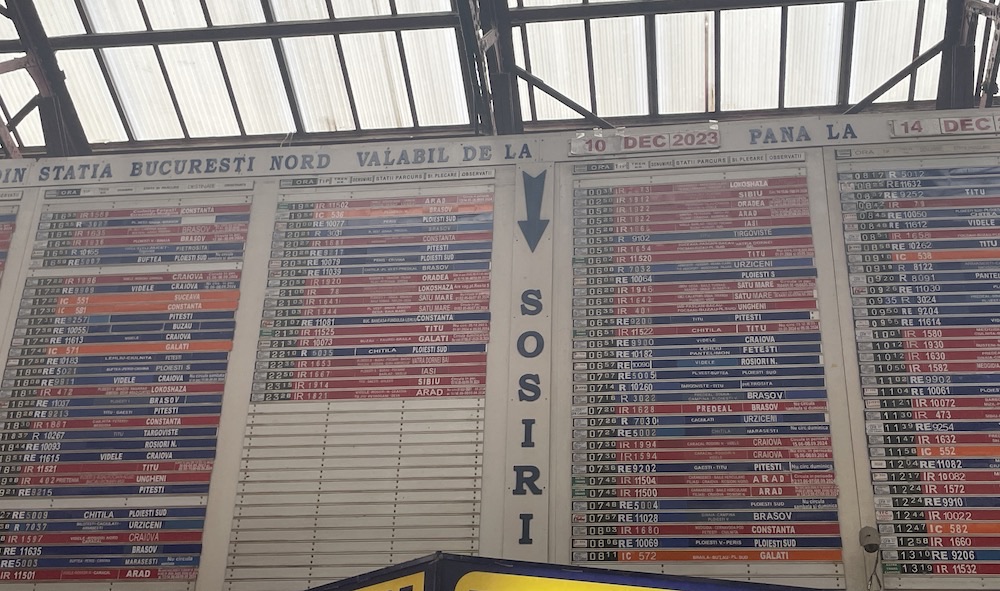
Ours was a brief stop-over in Bucharest – just long enough to discover that it’s home to possibly the most beautiful bookshop in the world housed in a Captain-Von-Trapp-meets-Kew-Garden-Palm-House mezzanined mansion, and mind blowingly grand, now somewhat dilapidated apartment blocks (one of which we had the pleasure of staying the night in in), insane 3 lane city highways, and of course the mighty Danube which we’d crossed just the day before over a thousand miles upstream in Vienna.
Day 5, 10 August
Back at the station the following morning, I joined a queue outside a kiosk piled tantalisingly high with pastries, and came away with a parcel of flakey cheese-cake-ish slices that my neighbour in the queue assured me were savoury and ‘very good’, plus some honey-coloured sesame seed doughey twists that were too good to leave behind. The way I saw it, good snacks were going to be crucial for both time and appetite filling on this longest (24 hour) leg of our trip.
We climbed on board the 10.47 Istanbul train. This time it was a Turkish Railways couchette wagon, coupled to just 4 others the rest of which weren’t going any further than the Bulgarian border. I quickly arranged myself in my now favourite spot: back against the window wall of the couchette, legs outstretched on the bench, Orhan Pamuk’s novel, The Museum of Innocence next to me on the table, knitting in my lap.
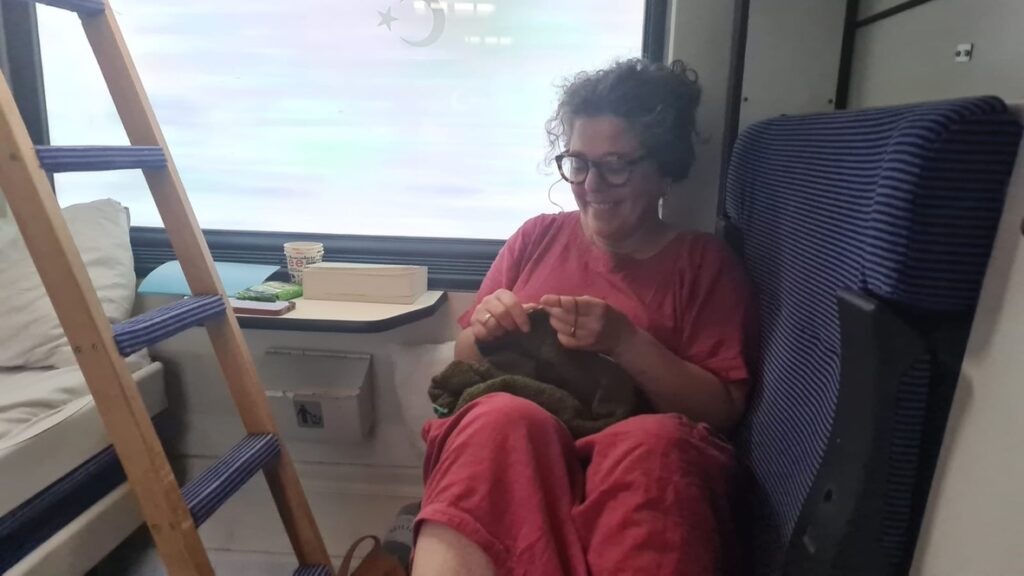
I counted my stitches and calculated that I was just 6 increase rounds away from the separation for the sleeves. I was confident my now diminished ball of Pastoreta would make it.
The compartment door opened and we were joined by a smiley Romanian couple, who set up home on the opposite bunks. Their spoken Romanian was way beyond me but It wasn’t long before we were gesticulating our way around the lack of subtitles with smiles and hand gestures so that we were soon sharing names and having a workshop on how to turn the seats into beds, and inexplicably becoming good friends.
As the train left the city behind, we went through miles and miles of sunflower fields. The sun was high in the cloudless sky and in spite of the breeze through the open window the compartment was getting hotter. My knitting was going nowhere so I put it away in favour of my paperback where I was deep in 1970s high society Istanbul and rejoined the ill fated affair of Orhan Pamuk’s protagonists, Kemal and Füsun. Eventually, the train guard interrupted the story with a tray of glasses of tea and assured us that the AC would kick in once we reached the electrified tracks across the Bulgarian border. I put away my book and walked down the corridor to the end of the wagon in search of more air, discovering with glee that our wagon’s caboose position on the train provided a mesmerising Harold Lloyd-style reel of the single track railway streaming away behind us.
The guard was as good as his word. We reached Ruse on the Bulgarian border – a sleepy colonaded station with wonderfully shady trees beside the platform. I joined other passengers in clambering off the wagon down to the tracks and found a drinking water fountain with just enough of a spout to splash my hot face and and sweaty hands, and by the time I was back in the train I could feel the refrigerated air of the AC beginning to fill the compartment. We closed the window, and I sat back while the wagon was shunted around and coupled onto new carriages that had come from Sofia all now bound for Turkey. We were on our way again.
The afternoon hours ran together in a mixture of The Museum of Innocence‘s impending tragedy for Kemal and Füsun, increasingly long rounds of my sweater yoke, napping and lunching. The Bucharest station kisoks’s savoury cheese cake pastries were long since eaten, but thanks to a sharp knife acquired in Frankfurt, I managed to fashion a salad out of an avocado and tomatoes left over from Vienna, and some stocky thick skinned cucumbers and a lemon I picked up from a disappointing supermarket in Bucharest.
The light began to fade and the guard returned with more glasses of tea. Still the train rolled on. We folded out the bunks and the sheets, blankets and pillows and I watched the orange sun dip below the horizon of the silhouetted landscape. I pulled the blind down over the window and was once again rocked to sleep by the motion of the train.
Day 6, 11 August
Another late night border crossing: This time we were at the Bulgarian-Turkish frontier. It was around 3am when the train stopped. The guard was going to each compartment in turn to explain that we needed to take ourselves and our luggage off the train to complete the immigration process. I made a half-hearted attempt at getting dressed by pulling some trousers on under my nightie and wrapped a cardigan around my shoulders, zipped the rest of my things back up in my back pack and hauled it and myself off the train, down to the tracks to join a queue of bleary eyed passengers snaking out of the immigration hall. Eventually it was my turn to hand my passport over to the surly Turkish border control man. I wanted to tell him I was sorry and I got it. Obviously this was the worst shift at the worst border post and I really hoped he could go home after he’d finished with all of us. Of course what I actually said was absolutely nothing.
Back on the train, the air in our compartment felt warm and stuffy. Muffled voices along the carriage soon died out. I lay on my back trying to keep as still as possible so as not to overheat, watching the light cast from the platform and an elongated shadow of the Turkish Railways crescent moon and star logo glide around the compartment as the train moved on and picked up speed.
Morning came and we made the bunks back into benches. The guard returned with a tray of welcome glasses of tea. I picked up my knitting again – re-counted the stitches and discovered that it was time to separate for the sleeves. I’m not sure what my face was saying but the smile of recognition on my Romanian companion’s face suggested that she understood and knew something good was going on for me. I worked the separation round, putting the sleeve stitches on hold and casting on additional underarm stitches, looked up from admiring my work only to realise that everyone else was getting their bags together.
“We’re coming into Istanbul,” D said. “You’ll need to pack that up.”
So I stuffed the knitting back into my project bag before I had a chance to see that the ball was almost finished.
“But doesn’t it take ages?”, someone asked after I got back home.
The context meant it wasn’t clear whether they were asking about hand knitting a sweater or taking a train across Europe to Istanbul, but I realised the difference didn’t really matter.
“It took me about 800 miles to get through a ball” I said, not really answering the question. “I’m not sure if that’s ages but we travelled a very very long way.”

